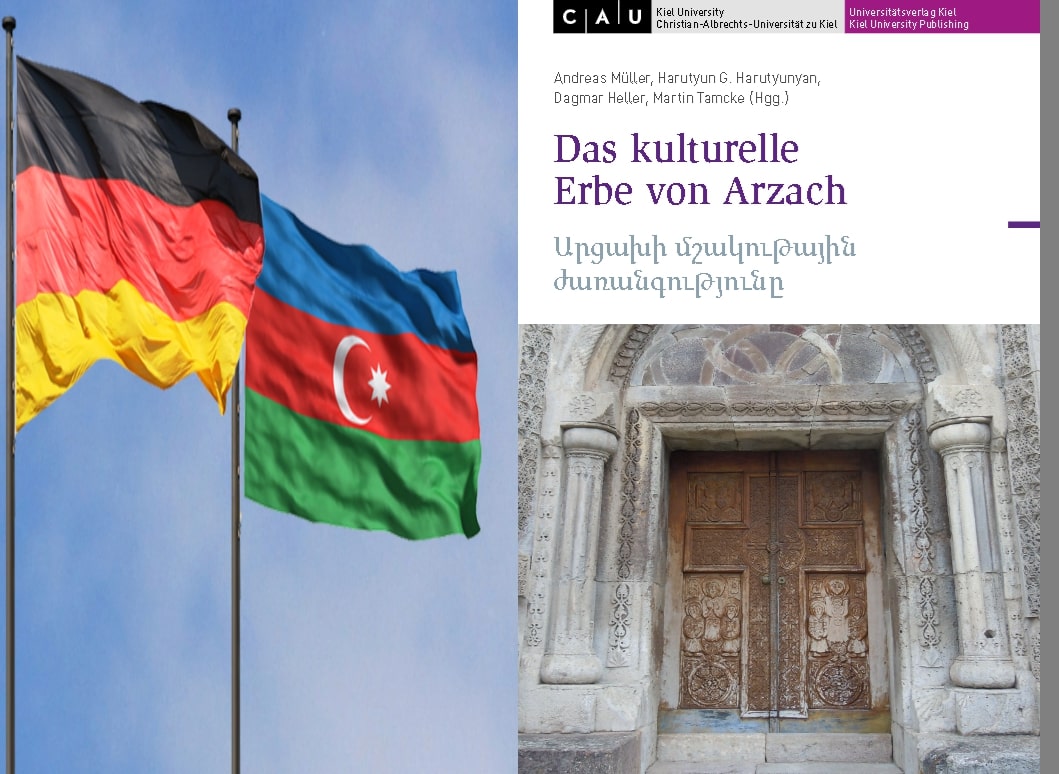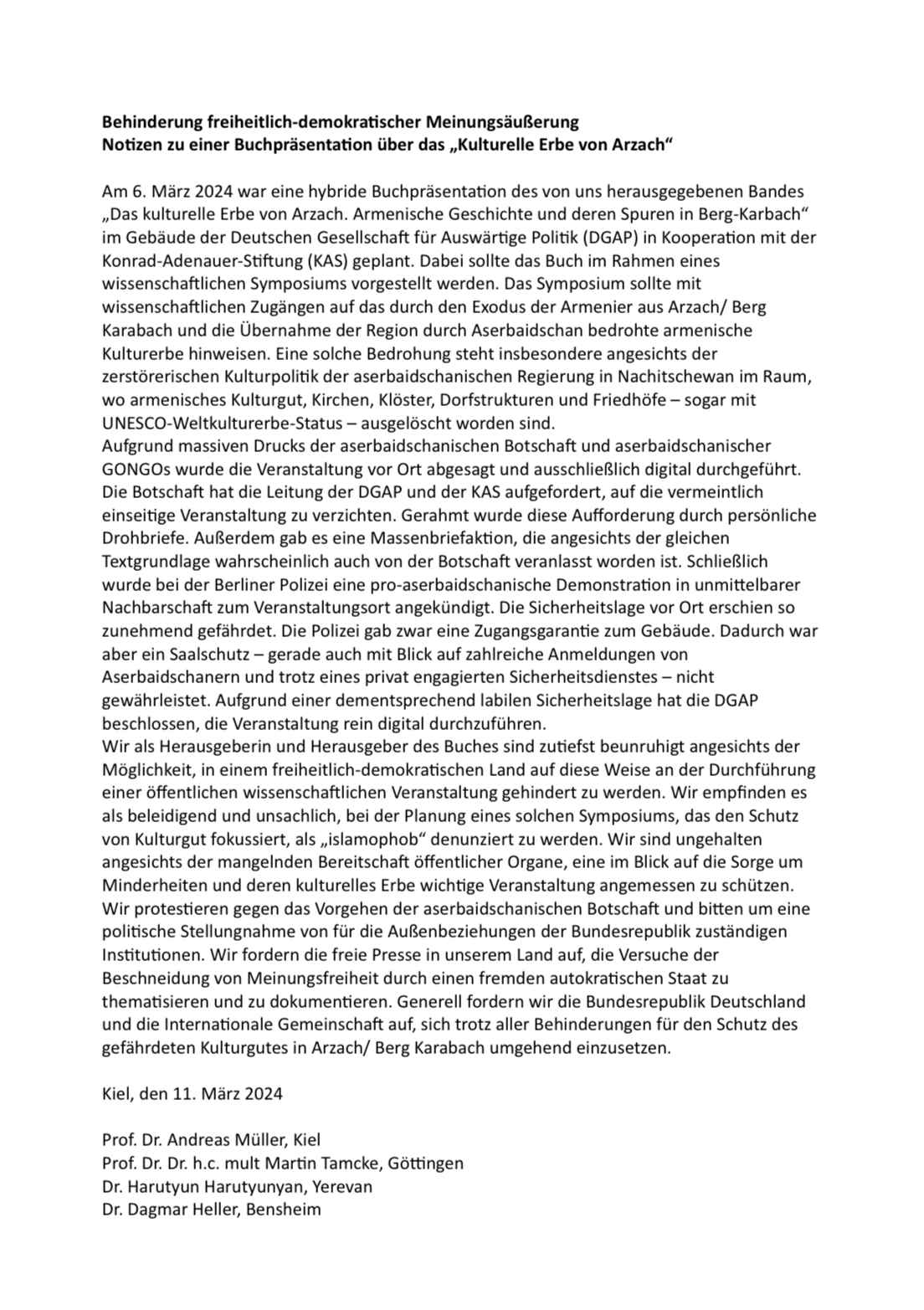Editors Andreas Müller, Harutyun Harutyunyan, Dagmar Heller, and Martin Tamke released a statement about the cancellation of their presentation of “The Cultural Heritage of Artsakh, Armenian History and Its Traces in Nagorno-Karabakh” in Berlin on March 6
As previously indicated, the publishing house of Kiel University in Germany has released "The Cultural Heritage of Artsakh: Armenian History and Its Traces in Nagorno-Karabakh," a compilation edited by Andreas Müller,
Harutyun Harutyunyan, Dagmar Heller, and Martin Tamke. The planned presentation of this collection was scheduled for March 6 of the current year in Berlin (https://monumentwatch.org/hy/2024/03/04/արցախի-
մշակութային-ժառանգությունը-2/).
Harutyun Harutyunyan, Dagmar Heller, and Martin Tamke. The planned presentation of this collection was scheduled for March 6 of the current year in Berlin (https://monumentwatch.org/hy/2024/03/04/արցախի-
մշակութային-ժառանգությունը-2/).
Regrettably, attempts to disrupt the presentation were successful, as widely propagated on numerous Azerbaijani Telegram channels. The event, originally scheduled for March 6, faced significant interference leading to its cancellation by the organizers, the German Council for Foreign Affairs (DGAP), and the Konrad Adenauer Stiftung (KAS), just one day prior, on March 5. This decision was made due to the perceived risks of escalation and the overwhelming mass campaign against the event, the instigators of which were not explicitly named.
Editors Andreas Müller, Harutyun Harutyunyan, Dagmar Heller, and Martin Tamke issued a statement on March 11, articulating their position with precision and clarity: “On March 6, 2024, a presentation of the volume "The Cultural Heritage of Artsakh: Armenian History and Its Traces in Nagorno-Karabakh," edited by us, was planned at the premises of the German Society for Foreign Policy (DGAP) in cooperation with the Konrad Adenauer Foundation (KAS). The event aimed to introduce the book within the framework of a scholarly symposium. The symposium was intended to draw attention to the endangered Armenian cultural heritage due to the exodus of Armenians from Artsakh/Nagorno-Karabakh and the subsequent takeover of the region by Azerbaijan. Such a threat looms especially in light of the destructive cultural policies of the Azerbaijani government in Nakhichevan, where Armenian cultural assets, churches, monasteries, village structures,
and even UNESCO World Heritage sites have been obliterated.
and even UNESCO World Heritage sites have been obliterated.
Due to massive pressure from the Azerbaijani embassy and Azerbaijani governmental non-governmental organisations (GONGOs), the on-site event was canceled and conducted solely in a digital format. The embassy urged the management of DGAP and KAS to refrain from holding the allegedly biased event. This demand was accompanied by personal threatening letters. Furthermore, a mass letter campaign, likely orchestrated by the embassy, was launched using similar texts. Additionally, a pro-Azerbaijan demonstration was announced to take place in immediate proximity to the event venue in Berlin. The escalating security situation on-site appeared increasingly perilous. While the police granted access to the building, adequate protection inside the venue—especially in light of numerous registrations from Azerbaijanis and despite the engagement of a private security service—could not be ensured. Therefore, due to the precarious security situation, DGAP decided to conduct the event purely digitally.
As editors of the book, we are deeply disturbed by the possibility of being hindered from conducting a public scholarly event in a liberal-democratic country in this manner. We find it offensive and baseless to be labeled as
"Islamophobic" in the planning of such a symposium, which focuses on the protection of cultural heritage. We are dismayed by the lack of willingness on the part of public authorities to adequately protect an event that is crucial for the preservation of minority concerns and their cultural heritage. We protest against the actions of the Azerbaijani embassy and call for a political statement from institutions responsible for the foreign relations of the Federal Republic of Germany. We urge the free press in our country to highlight and document attempts to curtail freedom of expression by a foreign autocratic state. In general, we call upon the Federal Republic of Germany and the international community to promptly intervene despite all obstacles to protect the endangered cultural heritage in Artsakh/Nagorno Karabakh.”
"Islamophobic" in the planning of such a symposium, which focuses on the protection of cultural heritage. We are dismayed by the lack of willingness on the part of public authorities to adequately protect an event that is crucial for the preservation of minority concerns and their cultural heritage. We protest against the actions of the Azerbaijani embassy and call for a political statement from institutions responsible for the foreign relations of the Federal Republic of Germany. We urge the free press in our country to highlight and document attempts to curtail freedom of expression by a foreign autocratic state. In general, we call upon the Federal Republic of Germany and the international community to promptly intervene despite all obstacles to protect the endangered cultural heritage in Artsakh/Nagorno Karabakh.”
Kiel, March 11, 2024
Prof. Dr. Andreas Müller, Kiel
Prof. Dr. Martin Tamcke, Göhngen
Dr. Harutyun Harutyunyan, Yerevan
Dr. Dagmar Heller, Bensheim
Prof. Dr. Andreas Müller, Kiel
Prof. Dr. Martin Tamcke, Göhngen
Dr. Harutyun Harutyunyan, Yerevan
Dr. Dagmar Heller, Bensheim

